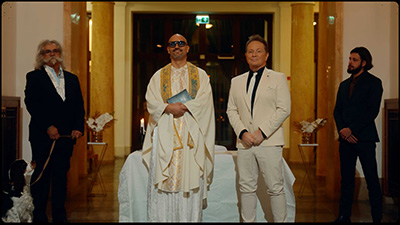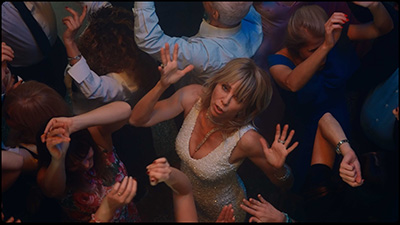
|

|



| Előadó: | Echo of Dalriada |
|---|---|
| Album: | Keressük! |
| Szövegírók: | Keressük a szövegírót! |
| Keressük a zeneszerzőt! | |
| Kiadó: | Keressük! |
| Stílus: | Keressük! |
| Címkék: | Keressük! |

Edward the king, the English king,
Bestrides his tawny steed,
"For I will see if Wales" said he,
"Accepts my rule indeed."
"Are stream and mountain fair to see?
Are meadow grasses good?
Do corn-lands bear a crop more rare
Since wash'd with rebel's blood?"
"And are the wretched people there,
Whose insolence I broke,
As happy as the oxen are
Beneath the driver's yoke?"
"In truth this Wales, Sire, is a gem,
The fairest in thy crown:
The stream and field rich harvest yield,
And fair are dale and down."
"And all the wretched people there
Are calm as man could crave;
Their hovels stand throughout the land
As silent as the grave."
Edward the king, the English king,
Bestrides his tawny steed;
A silence deep his subjects keep
And Wales is mute indeed.
The castle named Montgomery
Ends that day's journeying;
The castle's lord, Montgomery,
Must entertain the king.
Then game and fish and ev'ry dish
That lures the taste and sight
A hundred hurrying servants bear
To please the appetite.
With all of worth the isle brings forth
In dainty drink and food,
And all the wines of foreign vines
Beyond the distant flood.
"Ye lords, ye lords, will none consent
His glass with mine to ring?
What! Each one fails, ye dogs of Wales,
to toast the English king
"Though game and fish and ev'ry dish
That lures the taste and sight
Your hand supplies, your mood defies
My person with a sight.
"Ye rascal lords, ye dogs of Wales,
Will none for Edward cheer?
To serve my needs and chant my deeds
Then let a bard appear!"
The nobles gaze in fierce amaze,
Their cheeks grow deadly pale;
Not fear but rage their looks engage,
They blench but do not quail.
All voices cease in soundless peace,
All breathe in silent pain;
Then at the door a harper hoar
Comes in with grave disdain:
"Lo, here I stand, at thy command,
To chant thy deeds, O king!"
And weapons clash and hauberks crash
Responsive to his string.
"Harsh weapons clash and hauberks crash,
And sunset sees us bleed,
The crow and wolf our dead engulf
This, Edward, is thy deed!
"A thousand lie beneath the sky,
They rot beneath the sun,
And we who live shall not forgive
This deed thy hand hath done!"
"Now let him perish! I must have"
(The monarch's voice is hard)
"Your softest songs, and not your wrongs!"
In steps a boyish bard:
"The breeze is soft at eve, that oft
From Milford Haven moans;
It whispers maidens' stifled cries,
It breathes of widows' groans." Ne
"Ye maidens bear no captive babes!
Ye mothers rear them not!"
The fierce king nods. The lad is seiz'd
And hurried from the spot.
Unbidden then, among the men,
There comes a dauntless third.
With speech of fire he tunes his lyre,
And bitter is his word:
"Our bravest died to slake thy pride.
Proud Edward hear my lays!
No Welsh bards live who e'er will give
Thy name a song of praise."
"Our harps with dead men's memories weep
Welsh bards to thee will sing
One changeless verse our blackest curse
To blast thy soul, O king!"
"No more! Enough!" cries out the king.
In rage his orders break:
"Seek through these vales all bards of Wales
And burn them at the stake!"
His man ride forth to south and north,
They ride to west and east.
Thus ends in grim Montgomery
The celebrated feast.
Edward the king, the English king
Spurs on his tawny steed;
Across the skies red flames arise
As if Wales burned indeed.
In martyrship, with song on lip,
Five hundred Welsh bards died;
Not one was mov'd to say he lov'd
The tyrant in his pride.
'Ods blood! What songs this night resound
Upon our London streets?
The mayor should feel my irate heel
If aught that sound repeats!"
Each voice is hush'd; through silent lanes
To silent homes they creep.
"Now dies the hound that makes a sound;
The sick king cannot sleep."
"Ha! Bring me fife and drum and horn,
And let the trumpet blare!
In ceaseless hum their curses come…
I see their dead eyes glare…"
But high above all drum and fife
And all trumpets' shrill debate,
Five hundred martyr'd voices chant
Their hymn of deathless hate.


Valentin-napra jelent meg Geszti Péter és Péterfy Bori új közös dala, a Csak te meg én, amely a tavalyi sikerszám, a Beléd szerettem, ez van történetének folytatása.
A közönség most új fejezetet kap: a klipben a két előadó „összeházasodik”, a történet pedig ironikus, játékos formában mesél tovább a szerelemről, hűségről és a hosszú távú kapcsolatok realitásáról.
Diszkó a javából – mai csavarral
Ahogy a szilveszterkor megjelent Mindenki legyen rohadt gazdag! a funky hőskorából merített inspirációt, úgy a Csak te meg én is a hetvenes–nyolcvanas évek diszkóvilágát idézi, friss, mai hangzással.
Lépegetős basszus, táncos groove, fülbemászó refrén, vonósok és fúvósok adják az alapot, miközben a dalszöveg tipikus Geszti-fordulatokkal reflektál a mai randikultúrára és generációs különbségekre.

A dal egyszerre romantikus és önironikus
„Megyek hozzád. Hozzám mész. Nyugi, csak az első 20 év a nehéz!” – hangzik el a refrén környékén, miközben az Instagramon felbukkanó fiatal udvarlók és a hűség kérdése is játékos formában kerül terítékre.

Új klip – új fejezet
A klip egy esküvő történetét meséli el, ugyanazzal a humorral és vizuális önreflexióval, amely az előző videót is jellemezte. A menyasszony ezúttal sem eladó – és aki szemet vet rá, az könnyen „kivonódhat a forgalomból”. A történet természetesen happy enddel zárul. A szerzői és alkotói csapat ugyanaz, amely a Beléd szerettem, ez van esetében is dolgozott – a cél pedig egy különleges, folytatásos sorozat megteremtése a hazai popzenében.

Péterfy Bori az MVM Dome-ban is színpadra lép
A Csak te meg én Geszti készülő Poptimista című albumának második dala, és élőben is elhangzik majd 2027. január 30-án az MVM Dome színpadán, a nagyszabású POPTIMISTA koncert-show keretében. Péterfy Bori a meghívott vendégek között érkezik a Dome-ba, így a közönség a közös slágereket arénaméretű látványvilágban, élő hangszereléssel élheti át.